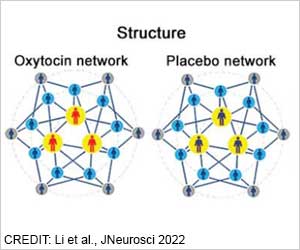, known for its involvement in bonding, may explain how humans evolved the cooperation needed to live in groups.
Li et al. gave intranasal oxytocin or a saline placebo to participants who occupied the most influential, or central, role in artificial social networks. The participants played a series of virtual games with strangers.
Advertisement
In one game, the central members received money from peripheral members and set a threshold for the minimum offer they’d accept. When the central members received oxytocin, cooperation spread through the network; after many rounds of the game, the offer and acceptance threshold evolved into a fifty-fifty split, a sign of cooperation.
In another game, oxytocin increased the likelihood central members would choose to cooperate and then punish peripheral members for uncooperative behavior, which tracked with the group increase in cooperation.
These results indicate cooperation from influential group members spreads to the rest of the group, likely through increased enforcement of social norms.
Source: Eurekalert



